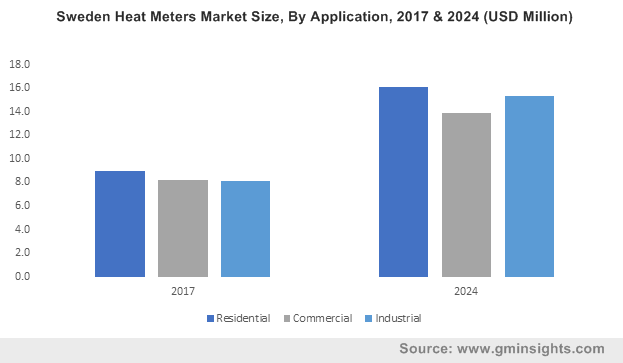Flux calorimeter market to amass commendable remuneration from residential applications, escalating adoption of smart meters to alter the industry dynamics
Publisher : Fractovia | Published Date : September 2018Request Sample
Growing preference towards the implementation of efficient district heating systems has proliferated the flux calorimeter market, owing to the need for improved metering solutions for optimizing energy consumption. Consumers are becoming more conscious regarding the wastage of resources and the benefits of using flux calorimeter to manage energy utilization, being able to adopt cost-effective usage patterns.
The widescale installation of district heating services have resulted from various government mandates asking to cut down on the use of fossil fuels and traditional heat systems, boosting the flux calorimeter industry. Commercial, industrial and residential communities in developed countries have readily shifted to district heating and cooling solutions to minimize the emission of green house gases, along with enjoying lower utility bills. Subsequently, the growth of the district heating segment for residential applications will directly propagate the flux calorimeter market, which reportedly earned more than USD 760 million worldwide in 2017.
Sweden Heat Meters Market Size, By Application, 2017 & 2024 (USD Million)

Europe has emerged as a leading district heating market in recent times, with countries such as Germany and Denmark being two of the prominent contributors, driving the flux calorimeter market growth. Denmark, in particular, has proven to be quite successful in renewal energy development and district heating services, mostly attributed to the introduction of the Heating Supply Act which mandates having district heating systems for upcoming buildings. In 2017, it was estimated that almost 63% residential population in Denmark used district heating, which indicates a vast customer base for the Europe flux calorimeter industry. A key factor influencing the adoption of district heating in residences is that combined heating solutions are available for generating the heat used for supply, while unused energy from renewable sources such as solar and wind farms can also be diverted to the heating systems.
In terms of numbers, Germany dominates the district heating segment in Europe and boasts of over 1,370 district heating systems, providing a lucrative revenue source for the flux calorimeter market. The industry penetration has further expanded from the development of smart meters and the integration of smart energy monitoring networks. Smart flux calorimeters are mostly remotely monitored and can provide historical as well as real time date on energy supply and consumption, helping to understand the utility usage behavior along with observing carbon emission levels. The flux calorimeter industry has witnessed an upsurge in the demand for smart flux calorimeter in mostly developed European nations to allow for a reduction in energy costs and monitor delivery of heating services.
Expounding the progress of smart flux calorimeter, Vattenfall, which is a Swedish power company with operations in other nations as well, had initiated an ambitious project in January 2018 to install smart flux calorimeter for all of its customers in Germany. The company claims that these meters will assist in optimizing fuel utilization and reduce carbon dioxide emissions, enhancing the efficiency and cutting down on costs. It aims to eliminate all manual meters and deploy smart meters to collect house-hold specific data which would be read every 15 minutes and sent over mobile network to the district heat control center for processing. Representing a massive leap for the flux calorimeter industry, the company plans to equip these digital meters in the state of Berlin by the end of this year, for ensuring uninterrupted heat supply to nearly 1.2 million district heating consumers.
Another instance where smart meters are transforming the flux calorimeter market is the district heating service in Lystrup, Denmark where about 10,000 residential occupants utilize heating supplied by Lystrup Fjernvarme. The utility provider has 3,800 meters installed and had been seeking ways to improve energy and operational efficiency of its district heating plant. The solution it decided on was to invest in intelligent meters being developed by Kamstrup, which could be remotely read and lets customers track consumption via smartphones. The smart meters also allow for monitoring leaks in the supply pipeline and also to observe operations output, as well as assisting the company to advise residents how to reduce their consumption.
All in all, the increasing acceptance of smart flux calorimeter in residential district heating systems will guarantee the existence of a significant demand for the flux calorimeter market over the coming years, as there is an escalating need for replacing conventional heating methods. Companies like Secure Meters, Kamstrup, Landis+Gyr, Engelman, Diehl, Danfoss, Ista, Siemens, Qundis and Sontex outline